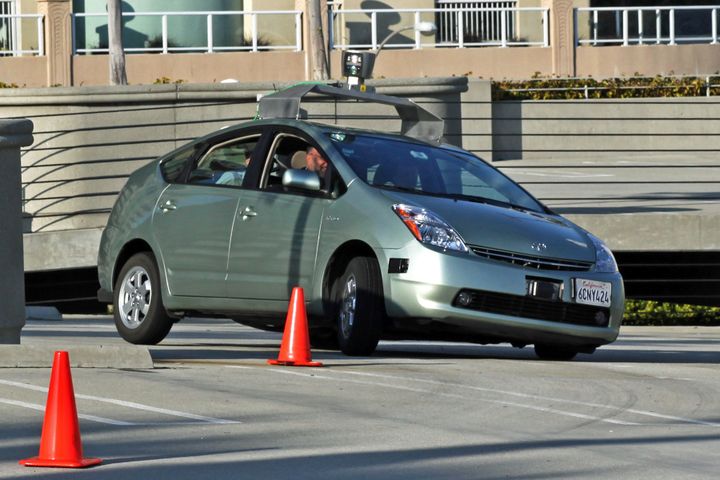
A driverless car from Google in tests. Credit: Wikimedia Commons
Distracted driving. Tiredness. Bad weather. Poor skills. These are just some of the reasons that accidents occur with a human behind the wheel of a car. We've made cars safer over the years, including features such as airbags and automated parallel parking, to try to reduce accidents. But perhaps a machine could do better. Or could it?
Google and many other organizations are creating driverless cars, which are essentially vehicles that could navigate on their own without the need of a person. Instead of needing to get yourself to work every day, you could sit inside of the vehicle and leisurely read the news on your device -- or get a little extra work done -- while your personal vehicle pilots you to your destination.
Google has tested the concept already in certain locations in California, and on the two occasions the driverless car was involved in an accident, the organization says that humans were responsible for them and not the car itself. But can cars really be that safe?
According to a Canadian report, driverless cars still have a long way to go. In 2012, according to CBC, Statistics Canada reported that six people died in car crashes for every one billion kilometers (620 million miles). A few more people die in the same distance per mile in the U.S., according to the NHTSA.
"Think about things like mobile phones and laptop computers ... They don't run nearly that long without failures," said Steve Shladover, program manager for the University of California at Berkeley's PATH (Partners for Advanced Transportation Technology) program, in the report. "But we're expecting a car to now operate that long without a failure in a very complicated environment?"
There are numerous areas where a computer would suffer, he added. Pedestrians and drivers often make eye contact to determine who should cross a road first. When the weather turns bad, a driver can adapt to the conditions, whereas an automated car may struggle. And there is also the element of unpredictability: a child chasing after a bouncing ball may not register in the computer's system as a hazard to avoid.
Still, the concept is generating a lot of buzz around the world. In February, the United Kingdom government authorized the first tests of driverless cars in four British cities -- with government backing to boot. “These are still early days but today is an important step. The trials present a fantastic opportunity for this country to take a lead internationally in the development of this new technology," transport minister Claire Perry said in a Guardian report.
In San Jose this month, Tesla chief executive Elon Musk told delegates at the Nvidia's annual GPU Technology Conference that he expects driverless cars will soon be as popular as smartphones. "I'm not worried about autonomous cars, it's more the deep-intelligence stuff where we need to be cautious, as there's different flavours of AI," said Musk in a report by The Inquirer. "Like a cell phone, you'll know exactly what to do [with them] and we'll be there in a few years," Musk said. "We'll take autonomous cars for granted in a short amount of time."
Meanwhile, in Vanccouver, Google's top self-driving executive delivered a TED talk where he said the program could be open to consumers in less than half a decade. "We’ve made some pretty exciting progress and at this point we’re pretty convinced this technology is going to come to market,” said Chris Urmson, director of self-driving cars, in a Globe and Mail report.
It all comes down to a matter of technology and trust. We can build self-driving cars, but are they reliable enough to trust with our lives? Only more testing and more studies can tell. Meantime, as this year we celebrate the 1985 Back to the Future movie portrayal of 2015, at least we can be comforted that the cars aren't self-flying. That would be a whole other dimension to Doc's troubles wih time travel.








